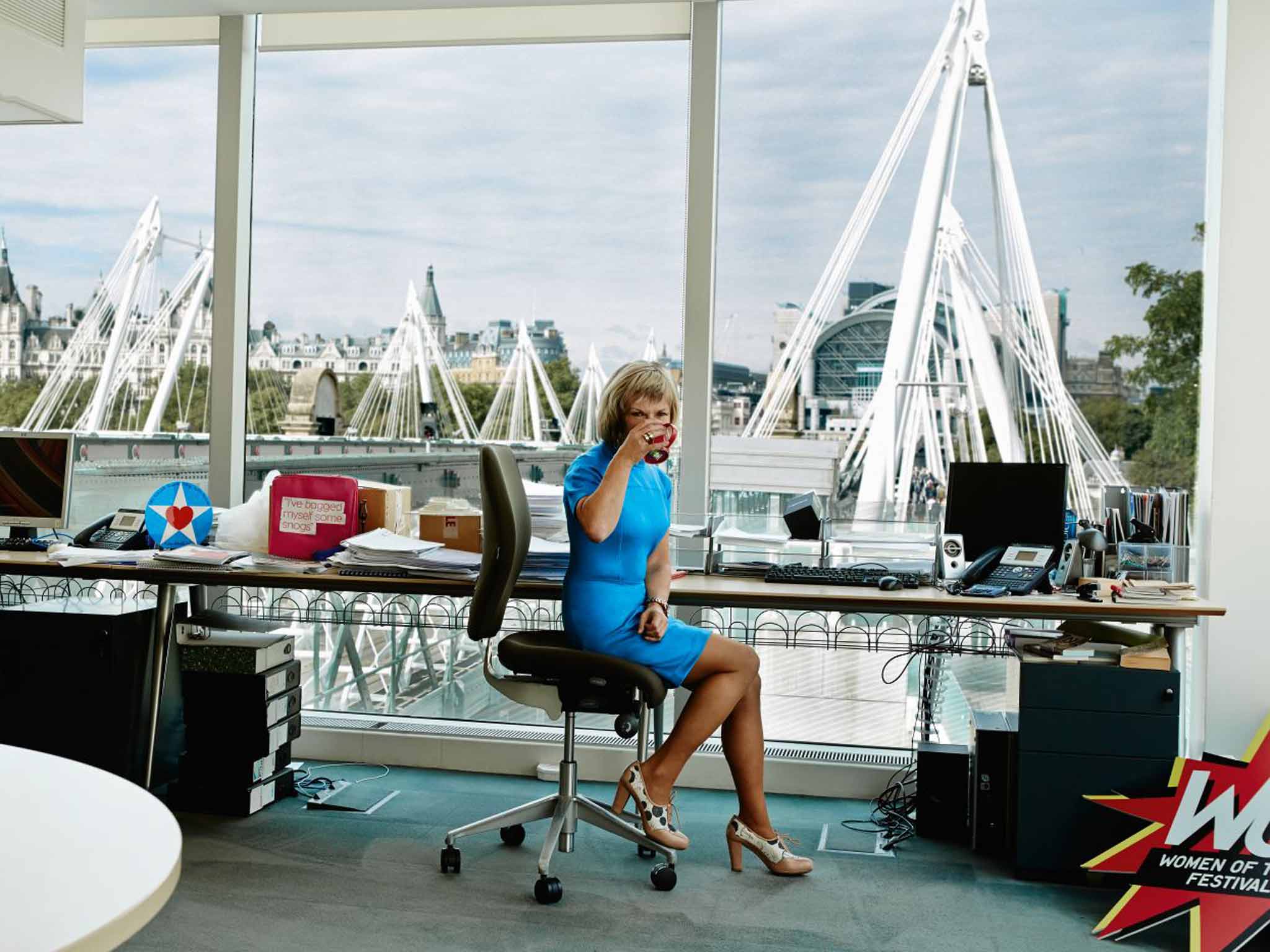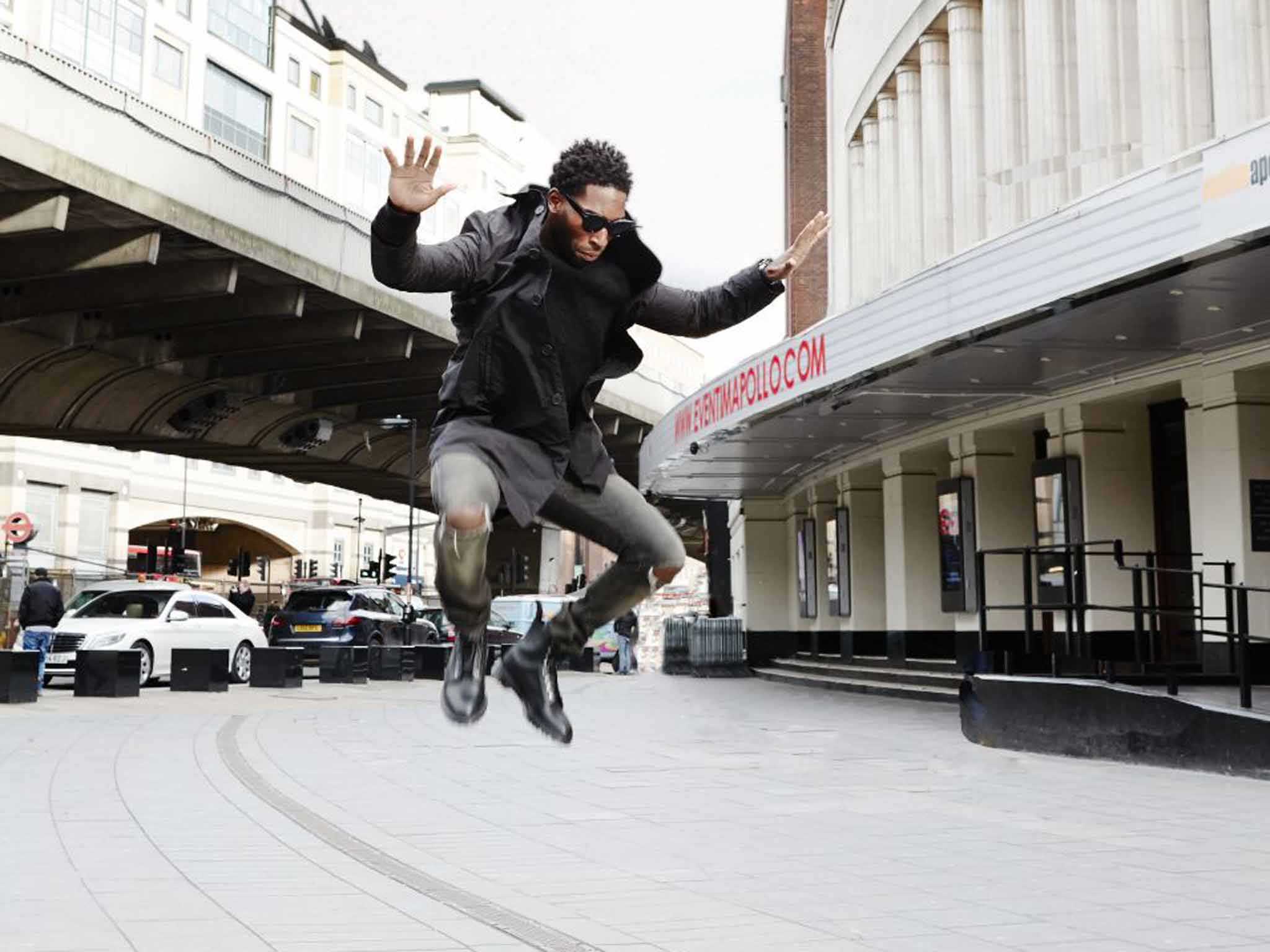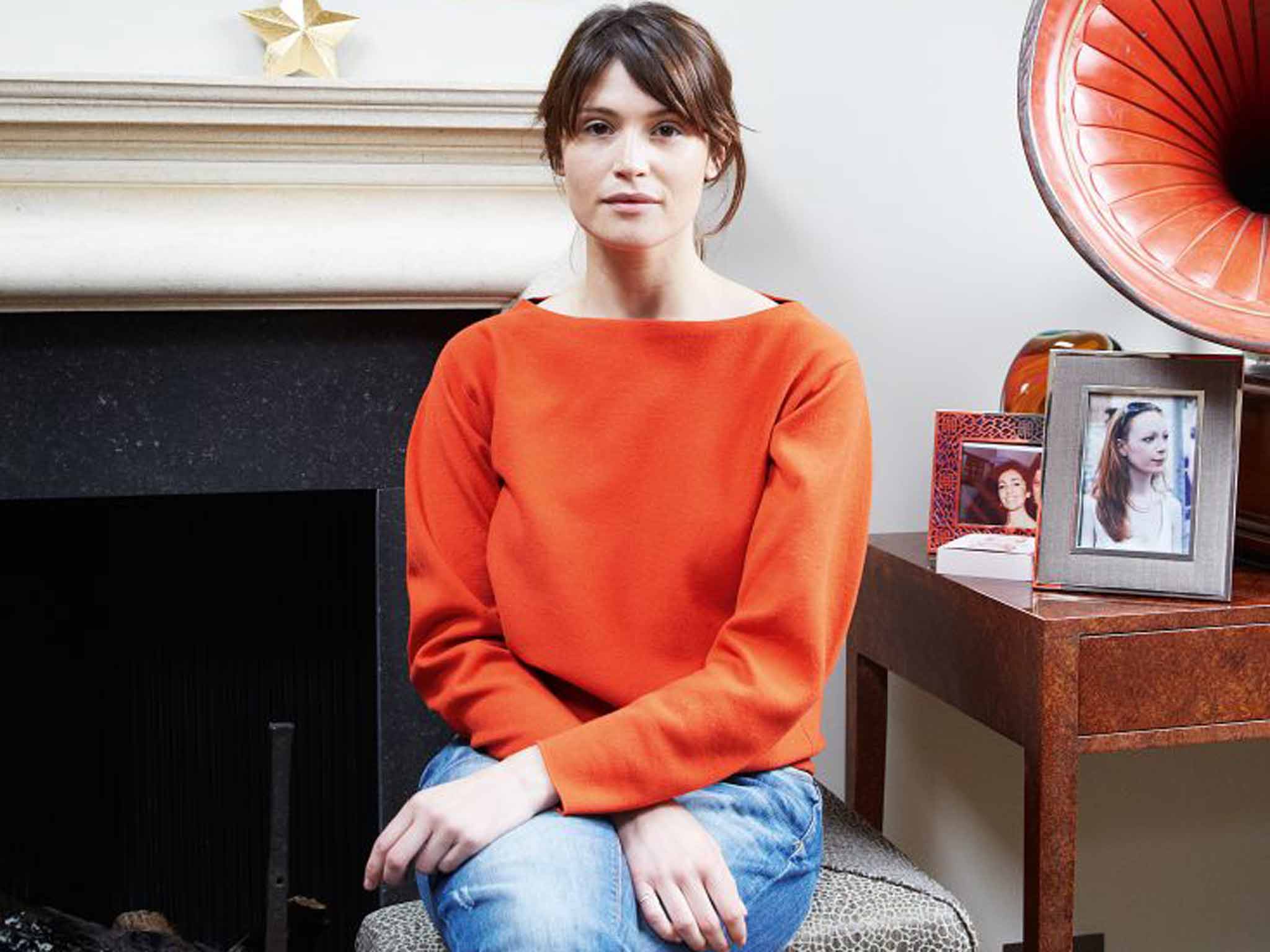How London's cultural trailblazers and their city have influenced each other: Exclusive book extract
From Nicholas Serota and Antony Gormley to Gemma Arterton and Jude Kelly

Your support helps us to tell the story
From reproductive rights to climate change to Big Tech, The Independent is on the ground when the story is developing. Whether it's investigating the financials of Elon Musk's pro-Trump PAC or producing our latest documentary, 'The A Word', which shines a light on the American women fighting for reproductive rights, we know how important it is to parse out the facts from the messaging.
At such a critical moment in US history, we need reporters on the ground. Your donation allows us to keep sending journalists to speak to both sides of the story.
The Independent is trusted by Americans across the entire political spectrum. And unlike many other quality news outlets, we choose not to lock Americans out of our reporting and analysis with paywalls. We believe quality journalism should be available to everyone, paid for by those who can afford it.
Your support makes all the difference.1. NICHOLAS SEROTA
Director, Tate
“My ambition was to connect London to the rest of the world. I grew up [with] important exhibitions being made in small museums in Continental Europe. I also watched major exhibitions being made in Paris and New York. Very few of those exhibitions were avant-garde; all were important, large historical surveys. I set up originally in Whitechapel to make a place in the UK that was the equivalent to any of the small museums (particularly in Germany, Belgium and Holland) that have a commitment to showing artists as they are emerging and to do so in a consistent way. Then you grow a public, and they grow an audience, and then you grow an influence. Then you provide a repository of knowledge and information and energy that is appealing to young artists.
When I came to the Tate, people had been saying, 'The great exhibitions pass London by.' I had the ambition that the Tate should be the place that had the expertise to make such shows, but that could also become part of a world that can command such shows… I've always loved the Tate…What I wanted to do was create a space that artists had respect for and an engagement with. You could say that in terms of contemporary art, the Tate had kind of lost its way. I just wanted to recover that.“
2. ANTONY GORMLEY
Artist
“It wasn't until I left Hampstead and escaped to the North Yorkshire countryside and experienced weather and moors, heather and forests and deep winters, that I began to live properly. One lives one's life in the hope that one will become a whole person. London was my birthplace and it remains my home because it is this critical mix of comfort and disturbance, but it was by leaving London that I realised what London is worth… London is an extraordinary place. It's a disease of a city, but once it gets you, you can't really leave it. It has more surprises than most places… The reason I'm here is that when I came back from India in 1974, I couldn't afford anywhere to buy or to rent. So I squatted a studio that has since been knocked down, literally half a mile away, between Caledonian Road and York Way. I was living on a boat that somebody gave me in Paddington Basin and cycling over here every morning. One morning this little kid said, 'Hey mate, don't you wan' a house?' I thought, that is exactly what I need, because the boat I was living on wasn't tall enough and I was constantly doubled over.
We went to see the house and it was empty so we broke in and moved in about two days later. Eventually we swapped that one for a larger house down the road. Anyway, that was just to say that the first thing most artists need is space, space for free, space that nobody else wants… In the Seventies we had a number of organisations like Space and Acme that were actively searching out council properties that weren't due for redevelopment because they said there wasn't enough capital and they would turn them into artists' studios. Those sorts of organisations are critical. “
3. JUDE KELLY
Artistic Director, Southbank Centre
It's interesting how you discover early on a sense of urgency and desire for purpose and apply it to things or, when something hits you – perhaps an injustice or an excitement – it draws from you this sort of drive and motivation. When you see pictures of me when I was four, I probably would have had the same physical position that I have now. I've always been leaning forward with my hands on my hips saying, 'Let's go!' There is something genetic about the desire to see things happen. So much that has led me to succeed… In London, one of the great things that has been happening over the past 10 years in art and culture is that a lot more of it is free, is on the streets, so the idea of accessibility is a push that London has been leading on. The counter-push is that the people who are gravitating towards owning culture are finding themselves wanting to belong to a social milieu that doesn't accept everybody.“
4. TAMARA ROJO
Artistic Director, English National Ballet
“London is really, in my opinion, a cultural centre of the world… I was 20 years old [when I came to London]… I wanted to be part of the London ballet companies, first English National Ballet, then Royal Ballet… Intelligence is the most important thing a ballerina needs. When you're confronted with the art of ballet, it is an ideal aspiration of what you want to achieve with your body. But then you have reality, which is your body. And each body is completely different. So you need intelligence to be able to understand your own limitations or your own qualities and see how you can use them for your best advantage to achieve this ideal. It's an intellectual reflection, even things as simple as remembering the steps.
Steps are mathematical equations, so anyone who doesn't understand mathematics is not going to understand how to remember steps… The steps in themselves have no meaning. It's like words. If you take words and put them out of order, they have no meaning. It's the same thing with steps. You can put steps together to break someone's heart... I've probably done 60,000 hours [of training] by now.
5. HANS ULRICH OBRIST
Co-Director, Serpentine Gallery
“I've worked in the field since I was a teenager. When I started, the word curating was not used [so much]. Often people didn't know what the word meant. This was pre-internet, the Eighties. When I told my parents that I wanted to become a curator, they thought it was a medical profession. They were very excited. We didn't clear up that misunderstanding for a couple of years because it sort of created comfort. Today curating is everywhere. Joseph Beuys said everyone is an artist; now everyone is a curator. The internet has had an effect, but so has globalisation… The most important thing for me always has been that the most important people in the world are artists.
Every morning I read Edward Lifson when I wake up, the poems and the novels of this man. I need him to give me strength to resist the homogenising thoughts of globalisation. It's a way of resisting the pressures of a more unified experience of time and space. That's what exhibitions do. They resist that homogenisation… In London at the moment, there is no end in sight [for maintaining its position]. It's much more central than if you were in the US; it's difficult to go to the Middle East from there, to go to Asia, Central Asia or Russia. From here it's relatively easy. It's also interesting that now all cultures are in London. It is the only city in Europe that has this cosmopolitan dimension. The only thing that endangers it is that real estate becomes too expensive. The real estate bubble prevents creative people from staying. Nevertheless, London has incredible resilience. It always bounces back.“
6. PETER ACKROYD
Novelist/Biographer/Poet
“I've written a lot about London, not only histories. Most of my fiction is engaged with the history of London too, whether it's Hawksmoor, Chatterton or The Lambs of London. It's been a constant theme in my work… [My London life started] in East Acton, which was a 1918 development. My earliest memories are concerned with that small neighbourhood… The first book I read which had real meaning for me … was Erich Heller's The Disinherited Mind. That caught my imagination. I thought, that's what I would like to do… I don't pay attention to my books' successes… I do write a thousand words a day if I can. I don't know where it comes from. It could be anything…
I do about three books at a time, but not of the same kind… I suppose having to go through the rigmarole of exams and scholarships and grants, I taught myself it was important to be disciplined to succeed… Luck came into it a lot. The biggest stroke of luck was when I came back to England after being at Yale. I wrote to every editor in London asking for employment. One of the letters was replied to by a man called George Gale, who was then editor of The Spectator. The luck was that his literary editor had just left. We had a short talk in a public house and he offered me the job of literary editor.“
7. GRAYSON PERRY
Artist
“I came to London [from Essex] as a child, did the classic things, went to the British Museum, went to St Paul's. It's only a half hour on the train… I have mixed motives [as an artist]. I sometimes need to make money, sometimes I need a bit of attention, other times I make work about social issues that interest me… I'm a local artist. The metropolitan and cultural life of one of the world's greatest cities, that's my local culture. As a visual artist, I've been incredibly fortunate that I've been in London when it's gone mad. When I came to London [in 1983] and you were working in contemporary art, it was like a backwater of culture… I was a squatter. There would have been maybe 50 contemporary-art galleries, maybe less. I don't know how many hundreds there are now.
It's a mix of things [that has caused this change], isn't it? It's to do with the stability of the British political and social system. It's a safe place to dump money, you know, property. And it's an English-speaking access into Europe, so it joins Europe and America. It's also, of course, a hugely diverse international population. There is a natural sophistication that comes from being rubbed up against lots of different cultures… There is an element of dog-eat-dog ; it's incredibly competitive… If you can't stand the heat in the kitchen, then get out. It's a hard place.“

8. TINIE TEMPAH
Musician
“Well, at 12 years old I decided I wanted to do music. I remember being in school and I said, 'OK, I'm going to take this seriously now. I need a cool name.' I flicked through a thesaurus and saw 'anger' and, underneath that, 'temper'. I said, 'I like ”temper“, but I need something to soften it.' I put 'tinie' in front of it, and that was it… I've always been advised to work hard and be able to do everything by myself. Whatever anyone's able to do for me, I'm always grateful, 'cause I don't expect anything… I engaged with music around maybe 15 years old. I'm from south London, but there was this whole thing in east London called 'grime'. It was like hip-hop, but very underground and niche.
Being from south London, I found it difficult to penetrate that scene. There were no barriers or security at North Woolwich train station. I'd go to North Woolwich and then to Stratford and climb over the barriers there. I researched a lot of artists and would go to radio stations and find out where they were. After a year, I started to have lots of friends that were doing that kind of music from east London. I was able to record with them, and that's how I started making music. It was like being in an old boys' club or going to a particular school, like you couldn't get in if you weren't part of this thing. I had to almost disguise myself and sneak in through the back way… I came from a place where there are hoodies and gangs, but I'm not in a gang.“

9. GEMMA ARTERTON
Actress
“I grew up on a council estate, and when you grow up somewhere like that, it's hard to shake it off. Even when you're placed in über-glamorous circumstances, you can't quite fit in. I'm so grateful to have come from that, because I can see the disparities between the two! Well, to me the glamorous side is not real at all. I enjoy going to film festivals, I enjoy going out for nice dinners and living the nouveau-riche life, because that's what I am, nouveau-riche. Yet it's not where I feel comfortable. I guess that's why I live in south London still. Even though I live in a nice place, I still can be five minutes down the road and I'm in Brixton or wherever. I don't think I could ever live anywhere that was manicured because I'd find it very uncomfortable...
How weird is this: [my first job was in] the Warner Bros shop! And then I ended up working on Warner Bros films. I made my first film when I was 22… I remember one day I was serving a guy in the shop that was James Bond's stunt double, and he was boasting to everyone. And then, five years on, you're working on the same thing. It's weird. Life is full of things like that.“

10. GUY RITCHIE
Film Director
“I've been farting around central London, creatively, for the last 25 years, I suppose, and I've seen it change. I live just north of Soho. I'm excited about the creative aspect of London because, for the first time in my experience, it feels like the centre of the film-making world. I leave my house in the morning, and 30 minutes later I'm at the studio, where I have the best facilities in the world. My editor is 30 seconds away. Every movie that's being made here is a vast production. As you walk along the corridors, you have pirates, you have Martians, you have knights in shining armour. It's the quintessential idea of what a studio was like in the Fifties, in the golden age of cinema… Soho isn't dying; it's the antithesis of that. I lived on Wardour Street 20 years ago; it's infinitely more exciting to me now than it was then. All our films are made basically in Soho, the last two Sherlocks, all of the Harry Potters [post-production]… It's tax incentives, I imagine, is really what's pumped it in. ”
'London Burning: Portraits from a Creative City,' by Hossein Amirsadeghi, Executive Editor: Maryam Eisler, is published by Thames & Hudson on 19 October, £58, thamesandhudson.com
Join our commenting forum
Join thought-provoking conversations, follow other Independent readers and see their replies
Comments